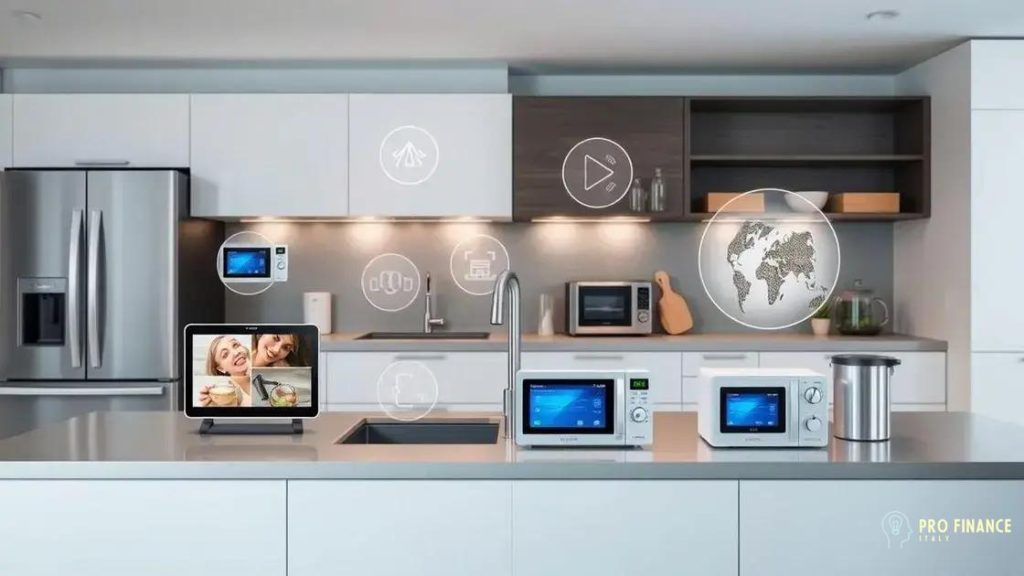The rise of smart appliances in home automation

The rise of smart appliances in home automation enhances convenience, energy efficiency, and safety, but challenges like cost, compatibility, and a learning curve can impact their adoption.
The rise of smart appliances in home automation is changing the way we live. Have you ever thought about how these devices can make your daily tasks easier? From automatic coffee makers to smart refrigerators, they can truly enhance our routines.
What are smart appliances?
Smart appliances are innovative devices designed to make your life easier and more efficient. They connect to your home network, allowing you to control them remotely through your smartphone or voice assistant.
Types of Smart Appliances
There are various types of smart appliances available today. Some of the most popular include:
- Smart refrigerators: These can monitor food expiration dates and even suggest recipes based on what’s inside.
- Smart ovens: They can be preheated from your smartphone and may offer guided cooking options.
- Smart washing machines: These allow you to start a cycle from anywhere and provide alerts when your laundry is done.
- Smart thermostats: They learn your schedule to optimize heating and cooling, saving on energy bills.
These devices offer convenience and enhanced features that traditional appliances lack. Imagine being able to check if you left the oven on or adjust your thermostat while you’re away from home! The integration of technology into our appliances has revolutionized how we interact with our homes.
Benefits of Smart Appliances
Not only do smart appliances provide convenience, but they also promote energy efficiency. Many of these devices are designed to consume less power, reducing your overall utility costs. For instance, smart thermostats can learn your habits and adjust settings when you’re not at home, ultimately saving energy.
Additionally, smart appliances often integrate with home automation systems, allowing for seamless control of multiple devices. This can lead to a more cohesive and efficient smart home experience. As we embrace technology, the potential for further innovations in this field remains exciting.
Benefits of integrating smart appliances

Integrating smart appliances into your home can lead to many advantages. These devices are designed not only for convenience but also to enhance your daily life. Imagine managing your home appliances from your couch or even miles away!
Convenience and Control
One of the primary benefits is the level of control you gain. You can operate your appliances remotely through an app, which allows you to:
- Start or pause devices while away from home.
- Receive notifications about appliance status.
- Schedule operations for optimal convenience.
This integration minimizes the hassle of daily chores, as you can monitor your home’s operations effortlessly.
Energy Efficiency
Another significant advantage is energy efficiency. Smart appliances can help you save on energy bills by:
- Optimizing energy usage based on your habits.
- Automatically powering down when not in use.
- Providing insights on energy consumption through apps.
This not only lowers your expenses but also supports a more sustainable lifestyle.
Enhanced Safety Features
Smart appliances also come with enhanced safety features. Many include:
- Automatic shut-off systems to prevent accidents.
- Alerts for maintenance issues or malfunctions.
- Remote monitoring options for safety checks.
This peace of mind can be invaluable, especially when managing a busy household.
Overall, the benefits of integrating smart appliances are profound and multifaceted, improving efficiency, safety, and comfort in everyday living.
How smart appliances enhance energy efficiency
Smart appliances significantly enhance energy efficiency in homes. They are designed with advanced technology that helps reduce energy consumption while still providing excellent performance.
Energy Optimization
Many smart appliances learn your habits and adjust their operations accordingly. For instance, smart thermostats can:
- Automatically adjust the temperature when no one is home.
- Learn your preferences to create an efficient climate schedule.
- Provide real-time energy usage statistics to help you monitor consumption.
This optimization leads to reduced energy bills and a smaller carbon footprint.
Remote Control and Automation
With smart appliances, you can control devices remotely, which encourages smarter energy use. You could check whether you left the washing machine running or if the oven is still on. Features like
- Scheduled operations that run during off-peak energy hours.
- Energy-saving modes that engage when you’re not using the device.
- Notifications that alert you to any excessive energy use.
Such capabilities ensure that energy is only used when necessary, optimizing your home’s overall efficiency.
Integration with Renewable Energy Sources
Smart appliances also integrate seamlessly with renewable energy sources, like solar panels. For example, they can:
- Shift their operations to times when renewable energy is plentiful.
- Help track and analyze your home’s energy consumption relative to renewable sources.
- Reduce reliance on grid energy by harnessing renewable energy more effectively.
This integration not only makes the home more energy-efficient but also promotes the use of sustainable energy solutions.
Top smart appliances to consider

If you’re looking to enhance your home, there are many smart appliances to consider. These devices offer a blend of convenience, efficiency, and the latest technology to improve your daily life. Here are some of the top options available.
Smart Refrigerators
Smart refrigerators keep an inventory of your food, notify you of expiration dates, and even suggest recipes based on the ingredients you have. They often feature:
- Touchscreens for easy access to recipes and notes.
- Camera systems that let you see inside the fridge from your phone.
- Shopping list capabilities that sync with your smartphone.
This functionality helps reduce food waste and keeps your kitchen organized.
Smart Ovens
Smart ovens can help you cook meals to perfection. Some features include:
- Guided cooking assistance for various recipes.
- Remote preheating and monitoring via an app.
- Self-cleaning capabilities that simplify maintenances.
These ovens make home cooking more approachable, even for those with busy schedules.
Smart Thermostats
Smart thermostats learn your temperature preferences and adjust the heating and cooling in your home efficiently. They offer:
- Energy-saving modes that reduce costs.
- Remote access to change settings from anywhere.
- Monthly energy reports to help you track usage.
By using a smart thermostat, you can significantly improve your home’s energy efficiency.
Smart Washing Machines
Smart washing machines let you control laundry cycles from your phone. They come with features like:
- Cycle recommendations based on load size and fabric type.
- Alerts when the laundry is finished.
- Energy-efficient modes that save on water and electricity.
This makes laundry a lot less burdensome and more efficient.
Each of these smart appliances not only fits seamlessly into your lifestyle but also enhances the way you manage your home.
Challenges in adopting smart appliances
Adopting smart appliances can present several challenges for homeowners. While these devices offer significant advantages, there are hurdles that can make integration difficult. Understanding these challenges is crucial for making informed decisions.
Cost of Smart Appliances
One of the main barriers is the initial cost. Smart appliances tend to be more expensive than their traditional counterparts due to the advanced technology they incorporate. Considerations include:
- Higher upfront costs for purchase.
- Potential need for additional smart home devices or hubs.
- Installation costs for complex appliances.
These financial factors can deter some people from making the switch to smart technology.
Compatibility Issues
Another challenge arises from compatibility between devices. Some homeowners might find that:
- Not all smart appliances work seamlessly together.
- Some brands may require specific hubs or platforms.
- Older homes may not have the necessary wiring or infrastructure for smart devices.
These complications can lead to frustration and confusion when trying to set up a smart home ecosystem.
Learning Curve
Using smart appliances often requires a learning curve. Individuals might struggle with:
- Understanding how to use new apps and interfaces.
- Finding ways to optimize settings for efficiency.
- Keeping up with software updates and technology changes.
This learning process can be overwhelming, especially for less tech-savvy individuals.
Privacy and Security Concerns
Lastly, many potential users worry about privacy and security. Smart appliances often connect to the internet, raising concerns about:
- Data collection practices by manufacturers.
- Potential hacking threats to connected devices.
- Overall vulnerability of the home network.
These issues can deter people from incorporating smart appliances into their lives.
FAQ – Frequently Asked Questions about Smart Appliances
What are smart appliances?
Smart appliances are devices that connect to the internet, allowing remote control and automated features to enhance convenience and efficiency.
How do smart appliances improve energy efficiency?
They optimize energy use by adjusting settings based on your habits and can schedule operations during off-peak hours.
What challenges might I face when adopting smart appliances?
Common challenges include high initial costs, compatibility issues, a learning curve, and concerns about privacy and security.
Are smart appliances worth the investment?
Yes, they can save time, reduce energy costs, and improve your quality of life, making them a valuable investment for many homeowners.





